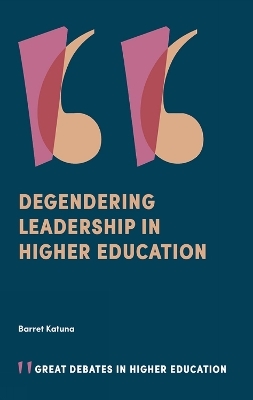
Degendering Leadership in Higher Education
Seiten
2019
Emerald Publishing Limited (Verlag)
978-1-83867-133-4 (ISBN)
Emerald Publishing Limited (Verlag)
978-1-83867-133-4 (ISBN)
Through 34 interviews with women and men serving as presidents, deans, and provosts at some of the United States' top colleges and universities, this book explores what degendered leadership looks like in an academic setting and creates a path for inspired, talented, and qualified leadership that is not reduced to gender norms and stereotypes.
Binary gendered leadership definitions are threatening to leaders whose styles do not match these narrow understandings, and do not leave room for trans, non-binary, and intersex leaders who do not fit within this binary that does not predict leadership styles. Through 34 interviews with women and men serving as presidents, deans, and provosts at some of the United States' top colleges and universities, this book explores what degendered leadership looks like in an academic setting.Higher educational settings have seen more women in leadership roles than in corporate and governmental settings, making this a prime setting for the study of the intersection of gender and leadership. Through interview analysis, the author addresses the following questions: What role does gender play in the narratives of women and men leaders? How might leaders’ gendering of leadership reproduce gender stereotypes? What strategies might leaders and institutions of higher education use to degender leadership? and What might degendered leadership look like?
This timely and important book creates a path for inspired, talented, and qualified leadership that is not reduced to gender norms and stereotypes. Institutions that wish to see leadership diversity and that strive toward creating inclusive academic communities need to pay attention to leadership expectations associated with stereotypes that encompass all identities including race, sexuality, ethnicity, age, and religion. This book is a tool for promoting leadership diversity.
Binary gendered leadership definitions are threatening to leaders whose styles do not match these narrow understandings, and do not leave room for trans, non-binary, and intersex leaders who do not fit within this binary that does not predict leadership styles. Through 34 interviews with women and men serving as presidents, deans, and provosts at some of the United States' top colleges and universities, this book explores what degendered leadership looks like in an academic setting.Higher educational settings have seen more women in leadership roles than in corporate and governmental settings, making this a prime setting for the study of the intersection of gender and leadership. Through interview analysis, the author addresses the following questions: What role does gender play in the narratives of women and men leaders? How might leaders’ gendering of leadership reproduce gender stereotypes? What strategies might leaders and institutions of higher education use to degender leadership? and What might degendered leadership look like?
This timely and important book creates a path for inspired, talented, and qualified leadership that is not reduced to gender norms and stereotypes. Institutions that wish to see leadership diversity and that strive toward creating inclusive academic communities need to pay attention to leadership expectations associated with stereotypes that encompass all identities including race, sexuality, ethnicity, age, and religion. This book is a tool for promoting leadership diversity.
Barret Katuna is the Executive Officer of Sociologists for Women in Society (SWS). Barret completed her PhD at the University of Connecticut, USA, and was previously a Visiting Assistant Professor at the University of Connecticut. While pursuing her PhD, Barret also earned certificates from the Women's Gender and Sexuality Studies Program and Human Rights Institute.
Chapter 1. Introduction Chapter 2. Effective Academic Leadership
Chapter 3. Learning How to Be an Academic Leader
Chapter 4. Gender and Leadership in Higher Education
Chapter 5. Conclusion, Implications and Suggestions
| Erscheinungsdatum | 06.09.2019 |
|---|---|
| Reihe/Serie | Great Debates in Higher Education Book Set (2017-2019) |
| Verlagsort | Bingley |
| Sprache | englisch |
| Maße | 129 x 198 mm |
| Gewicht | 391 g |
| Themenwelt | Sozialwissenschaften ► Pädagogik ► Erwachsenenbildung |
| ISBN-10 | 1-83867-133-1 / 1838671331 |
| ISBN-13 | 978-1-83867-133-4 / 9781838671334 |
| Zustand | Neuware |
| Informationen gemäß Produktsicherheitsverordnung (GPSR) | |
| Haben Sie eine Frage zum Produkt? |
Mehr entdecken
aus dem Bereich
aus dem Bereich
Lernende in ihrem Lernprozess wirksam begleiten und unterstützen. Ein …
Buch | Softcover (2024)
WBV Media (Verlag)
20,00 €
Prüfungsaufgaben - Rechnungswesen, Wirtschaft, Recht, Steuern
Buch | Softcover (2023)
Europa-Lehrmittel (Verlag)
26,90 €


